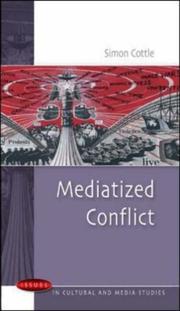| Listing 1 - 3 of 3 |
Sort by
|
Book
ISBN: 9781433109850 9781433109867 1433109859 1433109867 Year: 2011 Volume: 10 Publisher: New York: Peter Lang,
Abstract | Keywords | Export | Availability | Bookmark
 Loading...
Loading...Choose an application
- Reference Manager
- EndNote
- RefWorks (Direct export to RefWorks)

ISBN: 9780335214532 9780335214525 0335214525 0335214533 1280951095 033522461X 9780335224616 Year: 2006 Publisher: Maidenhead Open University Press
Abstract | Keywords | Export | Availability | Bookmark
 Loading...
Loading...Choose an application
- Reference Manager
- EndNote
- RefWorks (Direct export to RefWorks)
News media are more sophisticated today than ever before, while culture and politics have reached heights of chaos never before seen. How do media outlets choose what to report, and what are the impacts of their choices? 'Mediatized Conflict 'sheds much-needed light on the subject. An expert on the subject culls together the latest research and theories to examine how the media today have replaced socalled objective reporting with actively "enacting" and "performing" coverage of war and conflict.
Mass communications --- Demonstrations --- Mass media --- Social conflict in mass media. --- Terrorism in mass media. --- War in mass media. --- Press coverage. --- Political aspects. --- #SBIB:309H1025 --- Mediaboodschappen met een informatieve functie --- Social conflict in mass media --- Terrorism in mass media --- War in mass media --- Mass media and war --- Communication in politics --- Marches (Demonstrations) --- Political demonstrations --- Political marches --- Political rallies --- Public demonstrations --- Rallies (Demonstrations) --- Collective behavior --- Crowds --- Public meetings --- Riots --- Press coverage --- Political aspects --- Mass media Political aspects
Book
ISBN: 9780199375509 9780199375493 019937550X 0199375496 Year: 2016 Publisher: Oxford: New York: Oxford university press,
Abstract | Keywords | Export | Availability | Bookmark
 Loading...
Loading...Choose an application
- Reference Manager
- EndNote
- RefWorks (Direct export to RefWorks)
Risk and Hyperconnectivity brings together for the first time three paradigms: new risk theory, neoliberalization theory, and connectivity theory, to illuminate how the kaleidoscope of risk events in the opening years of the new century has recharged a neoliberal battlespace of media, economy, and security. Hoskins and Tulloch argue that hyperconnectivity is both a conduit of risk and a form of risk in itself, and that it alters the ways in which we experience events and remember them. Through interdisciplinary dialogue and case study analysis they offer original perspectives on the key questions of risk of our age, including: What is the path to a balance between individual privacy and state (or corporate) security? Is hyperconnectivity itself a new risk condition of our time? How do remembering and forgetting shape citizen insecurity and cultures of risk, and legitimize neoliberal governance? How do journalists operate as public intellectuals of risk? Through probing a series of risk events that have already scarred the twenty-first century, Hoskins and Tulloch show how both established and emergent media are central in shaping past, present and future horizons of neoliberalism, while also propelling wide pressure for its alternatives on those ranging from economics students worldwide to potential political leaders cultivated by austerity policies.
Mass communications --- Social conflict in mass media. --- Protest movements --- Political participation --- Disasters --- Neoliberalism. --- Risk --- Mass media --- Conflits sociaux dans les médias --- Catastrophes dans la presse --- Néo-libéralisme --- Risque --- Médias --- Press coverage. --- Sociological aspects. --- Social aspects. --- Political aspects. --- Aspect sociologique --- Aspect social --- Aspect politique --- Social conflict in mass media --- Neoliberalism --- Contestation --- Participation politique --- Press coverage --- Sociological aspects --- Social aspects --- Political aspects --- Couverture de presse --- Conflits sociaux dans les médias --- Néo-libéralisme --- Médias --- Protest movements - Press coverage. --- Political participation - Press coverage. --- Disasters - Press coverage. --- Risk - Sociological aspects. --- Mass media - Social aspects. --- Mass media - Political aspects.
| Listing 1 - 3 of 3 |
Sort by
|

 Search
Search Feedback
Feedback About UniCat
About UniCat  Help
Help News
News